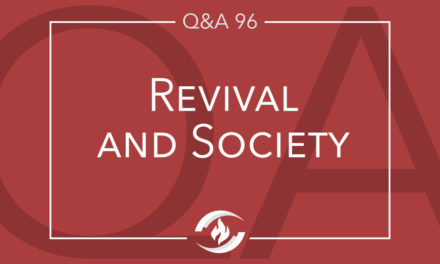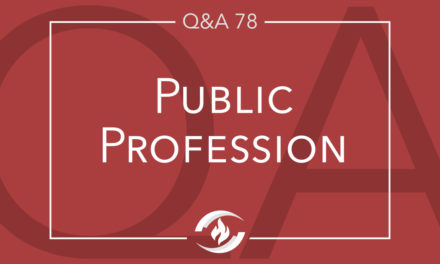Q.
Hey John,
I’ve read numerous places about praying for the manifest presence of God in our gatherings. But I don’t remember seeing the biblical basis outlined, especially from a NT standpoint. It seems like I’ve even read Edwards mentioning it. Any guidance on that principle?
Matt
A.
Hello Matt,
Great question! You probably do rightly remember Edwards addressing this. He and Whitefield spoke much on the need for regular effusions (outpourings) of the Spirit. It was a regular part of their vocabulary. Let’s first consider the concept of God’s manifest presence, and then let’s look at this from both an Old Testament and a New Testament perspective.
First, we must understand the difference between God’s omnipresence and His manifest presence. Yes, God is everywhere present. But there are multitudes of people who are not conscious of God. God is not in their thoughts. But when God manifests His presence, everyone in that vicinity, whether it be in a church auditorium or in a community, becomes aware of the presence of God. God’s manifest presence is spiritual, not physical, but it is just as real as if it were physical. This can vary in degrees of intensity, duration, and extent of geographic breadth. But what is the biblical basis?
In the Old Testament, Isaiah cried out for God to rend the heavens and come down, so that there would be impact “at thy presence” (Is. 64:1-3). In fact, he uses the phrase at thy presence three times in that particular part of his prayer. Isaiah was asking for the manifest presence of God. The manifest presence of God is the same concept as God pouring out His Spirit. In Ezekiel 39:29 God says, “Neither will I hide my face any more from them: for I have poured out my spirit.” God here defines the outpouring of His Spirit as no longer hiding His face. The word face is the same word translated as “presence” in Isaiah 64. So God defines the outpouring of His Spirit as no longer hiding His presence—which is manifesting His presence. Twice the Scripture admonishes God’s people to seek His presence on a regular basis: “seek his face [presence] evermore” (Ps. 105:4) and “seek his face [presence] continually” (1 Chron. 16:11). But does this affect New Testament believers? In the great revival verse of 2 Chronicles 7:14, God Himself encourages His people who are called by His name to seek His face. Again this is the same word for presence. The inspired phrasing “If my people, which are called by my name, shall…seek my face [presence]” does not limit this to Israel but God’s people called by His name in any dispensation. That includes New Testament believers, who, as Christians, are obviously called by God’s name.
In the New Testament itself, Peter quotes Joel and brings the concept of God pouring out His Spirit (manifesting His presence) into the time period known as “the last days.” He said, “And it shall come to pass in the last days, saith God, I will pour out of my Spirit on all flesh” (Acts 2:17). If words have meaning and if language has integrity, then the outpouring of God’s Spirit is for the time period of “the last days,” which according to Acts 2 began on the Day of Pentecost and, according to 2 Timothy 3:1 and Hebrews 1:2, is still continuing. This promise reveals God’s intent for the church age—the age of the Spirit. God desires every generation to know His manifest presence. Therefore, since promises must be obtained (Heb. 11:33), it seems appropriate based on both Old and New Testaments to seek God’s manifest presence by asking for it.
It might help to remember that God knows best the degree of intensity and so forth for a given time. But the point is we need God’s reviving and saving presence all the time, especially when the saints meet as an assembly. There is a difference between a man preaching as a Spirit-filled man versus a Spirit-filled man preaching in an atmosphere saturated with the presence of God. In the former scenario a man preaches as a Spirit-filled man and rivers of living water flow, so that everyone who comes to drink gets blessed, while everyone else just sits there waiting for the service to be over. In the latter scenario a man preaches as a Spirit-filled man and rivers of living water flow, but in addition the atmosphere is saturated with the presence of God, so that not only those who came to drink get blessed, but those who came for other motives come face to face with God and have an opportunity to get blessed by the Blesser Himself.
I agree with Edwards. We need regular effusions of the Spirit. Hope this brings clarification.
John











